Periodontal disease, also known as gum disease, is a common dental problem that affects millions of people around the world.
This disease is caused by the buildup of plaque and bacteria on the teeth and gums, leading to inflammation, bleeding, and eventually tooth loss if left untreated. While most people think of periodontal disease as a dental problem, it can actually have serious implications for your overall health and well-being.
In this article, we’ll discuss some of the ways that periodontal disease can impact your health and why it’s important to take this disease seriously.
What is Periodontal Disease?
Periodontal disease is a chronic bacterial infection that affects the gums and bones that support the teeth.
It’s caused by the buildup of plaque and bacteria on the teeth and gums, which can lead to inflammation and damage to the soft tissue and bone. The early stage of periodontal disease is known as gingivitis, which is characterized by red, swollen, and bleeding gums.
If left untreated, gingivitis can progress to periodontitis, which is a more advanced stage of the disease that can cause permanent damage to the teeth, gums, and bones.
How Does Periodontal Disease Impact Your Health?
While periodontal disease is primarily a dental problem, it can actually have serious implications for your overall health and well-being. Here are some of the ways that periodontal disease can impact your health:.
1. Cardiovascular Disease
Studies have shown that there is a link between periodontal disease and cardiovascular disease.
This may be due to the fact that the bacteria that cause periodontal disease can enter the bloodstream and travel to other parts of the body, including the heart. Once there, they can cause inflammation and damage to the blood vessels, which can increase the risk of heart attack and stroke.
2. Respiratory Disease
Periodontal disease has also been linked to respiratory disease, such as pneumonia and chronic obstructive pulmonary disease (COPD).
The bacteria that cause periodontal disease can be inhaled into the lungs and cause infection or inflammation, making it harder to breathe and increasing the risk of lung disease.
3. Diabetes
If you have diabetes, you’re at an increased risk of developing periodontal disease. This is because diabetes can weaken your immune system, making it harder to fight off infection.
Periodontal disease can also make it harder to control your blood sugar levels, leading to complications with your diabetes.
4. Pregnancy Complications
Women who have periodontal disease during pregnancy are at an increased risk of complications, such as preterm birth and low birth weight.
This may be due to the fact that the bacteria that cause periodontal disease can enter the bloodstream and affect the developing fetus.
How Can You Prevent and Treat Periodontal Disease?
Preventing and treating periodontal disease is essential for both your dental and overall health. Here are some tips for preventing and treating periodontal disease:.
1. Practice Good Oral Hygiene
The best way to prevent periodontal disease is to practice good oral hygiene. This means brushing your teeth twice a day, flossing daily, and using mouthwash. You should also visit your dentist regularly for cleanings and checkups.
2. Quit Smoking
Smoking can increase your risk of developing periodontal disease, as well as other health problems. If you smoke, it’s important to quit to protect your dental and overall health.
3. Maintain a Healthy Diet
Eating a healthy, balanced diet can also help prevent periodontal disease. This means avoiding sugary and processed foods, and eating plenty of fruits, vegetables, and lean protein.
4. Seek Treatment for Periodontal Disease
If you have periodontal disease, it’s important to seek treatment as soon as possible to prevent further damage to your teeth and gums. Treatment may include deep cleaning, medication, or surgery depending on the severity of your condition.
Conclusion
Periodontal disease is more than just a dental problem – it can have serious implications for your overall health and well-being.
By practicing good oral hygiene, quitting smoking, maintaining a healthy diet, and seeking treatment for periodontal disease, you can help protect your dental and overall health for years to come.

























